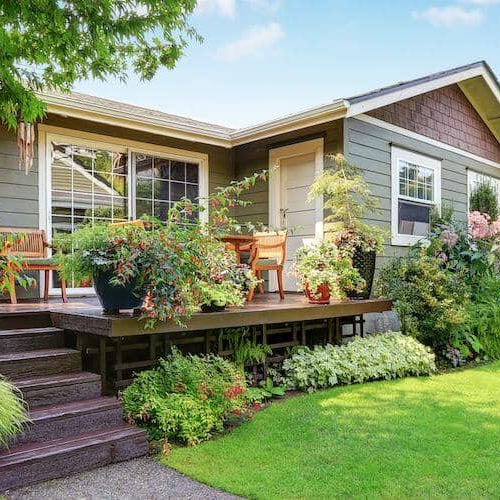Lease option: Definition and how it works
May 30, 2025
•5-minute read
Have you recently thought about buying a house, but you aren’t sure if you’re ready to commit? One solution is a rent-to-own agreement, where you rent a home before buying it. You can do this with a lease option agreement.
What is a lease option?
A lease option is a clause in a rental agreement that lets the tenant buy the property at the end of the lease.
The homeowner and the tenant are free to work out the details, including the length of the lease, the purchase price, and when the tenant must exercise their option to buy. A lease option usually requires the tenant pay an option fee. The agreement also determines how much of the tenant’s monthly rent payment is credited toward buying the home.
A lease option gives the renter flexibility. They can buy the home when the lease is up or walk away from the deal and forfeit the lease option fee.
The property owner is unable to sell the home to anyone else, but a lease option sets up a potential sale and earns rent in the meantime.
What’s the difference between a lease option and a lease purchase?
A lease purchase is a clause in a real estate contract where the tenant agrees to buy the home from the landlord at the end of the lease. A lease option allows the tenant to decide whether to buy the home at the end of the agreement. The difference is that at the end of a lease purchase agreement, both parties have already agreed to a sale.
What’s included in a lease option?
A lease option contract looks like a regular rental agreement with a few extra clauses. A lease option typically includes:
- A finite lease term. This is how long the tenant rents the property before they can buy it.
- The purchase price. A lease option deal should include the price the tenant will pay the owner if they choose to buy the home.
- Option fee. This up-front fee the tenant pays the owner is usually 1% to 7% of the agreed-upon purchase price.
- Monthly rent. The deal will include the monthly rental amount, as well as who’s responsibility for utility bills.
- Rent credit. Specifies how much of the rent is credited toward a down payment on the home.
- Commitment to purchase. A lease option should clarify that the homeowner is committed to allowing the renter to buy the property at the end of the lease.
Lease with option to buy: How it works
The path to living in a lease with an option to buy is like the path of finding a place to rent, but it’s also a bit like finding a home to buy. Let’s look at exactly what steps are involved.
1. Sign the contract
You and the owner negotiate and sign a rental contract with a lease option clause. It’s always a good idea to ask a real estate attorney to review a contract before signing it.
2. Pay the option fee
Once you sign the contract, you’ll pay the agreed-upon option fee as well as any required security deposit. The option fee is usually credited toward the purchase price of the home, not the down payment. Make sure the terms are fully and clearly explained in the contract.
3. Pay rent
You’ll move in and start paying rent. Part of your payment may be credited to a down payment on the home, so you may pay more per month than the average rent in the area.
4. Decide whether to buy
When the lease expires, you can buy the home or walk away. If you buy, you get a mortgage and close on the sale. If you walk, you probably forfeit the option fee and any money you paid toward the down payment but you won’t get stuck with a house that’s not right for you. The owner keeps the option fee and the house.
When does a lease option make sense?
A lease option can be a good deal for buyers and sellers.
For buyers
The obvious benefit of a lease option is you can live in a home before buying it. Other benefits include:
- Locked-in purchase price. If you buy the house, you’ll pay the price you and the landlord agreed on at the start of the lease. You’ll pay the negotiated price, even if the property’s increased in value.
- No bidding wars. Nobody else can buy the home while the lease is in effect, which means you won’t have to compete with other buyers.
- Time to plan. You have time to improve your credit score and save for expenses like the down payment and closing costs. This can help you get approved for a mortgage with better terms by the time the lease is up.
For sellers
Benefits of a lease option for sellers include:
- Rental income. If you are going to sell the house anyway, a lease option lets you earn rental income while you wait. If the tenant decides not to buy, you’ll keep the option fee and any money paid toward the down payment.
- Could help a property sell. Sometimes a property is challenging to sell. A lease option gives potential buyers a chance to live in the home and discover its charms before deciding to buy.
- Combines the benefits of selling and holding real estate. You might lose a sale, but you won’t lose the house. You can instead hold it in your real estate portfolio.
When does a lease option not make sense?
Even if a lease option sounds like a great idea, it doesn’t make sense in every situation.
For buyers
What if you really love the house you’re leasing with an option to buy but can’t get approved for a mortgage when the lease is up? This can lead to heartbreak, so if you’re going into a lease option agreement, you’ll want to make sure your finances are in order. While you don’t have to get approved for a mortgage, learn about being qualified.
If you struggle to see yourself living in this home, then paying the extra fees to secure a lease-option isn’t the best use of your money.
For sellers
Lease options are a little riskier for property owners because the tenant might not go through with the purchase. You’ll have to start the sale process from scratch, which will take time.
Even if your home has increased in value, a lease option requires you to sell it to the tenant for the price you agreed to. You may miss out on selling your home for more money.
FAQ
Here are answers to common questions about lease options.
Who should write a lease option contract?
A lot of money and importance might be on the line, so you’ll want an expert to write your lease option contract. A real estate attorney is the best option.
Where can I find homes with a rent-to-own option?
A real estate agent can help you find lease option homes in your area. You also can ask a homeowner directly if you’re really interested in buying their property but want to live in it first. It never hurts to ask.
Can I get out of a lease option agreement?
Yes. A lease option agreement is different from a lease purchase agreement because you can choose to not buy the property when the lease is up. If you do this, you’ll lose your option fee and any money you put towards the down payment. If you want to get out of a lease option agreement before the lease is up, you can ask your landlord to release you or look at your contract to see if there are any penalties for terminating the deal early.
The bottom line: A lease option could be right for you
A lease option lets you rent a home before deciding to buy it. At the end of the lease, you can walk away from the property or become a new homeowner. There are times when a lease option agreement makes sense for property owners and potential buyers.
Maybe after reading this article, you think you want to just buy a house without renting first. If so, you can start your mortgage application online today with Rocket Mortgage®.

Kate Friedman
Kate is a contributing writer and publisher who has worked with Rocket since 2022. She also works as a middle-school interventionist and has taught personal finance and life skills to high-schoolers.
Related resources

8-minute read
How to buy a house with no money down
Some mortgages allow you to buy a house with no money down. Learn how to buy a house with n...
Read more

8-minute read
How to determine if you should buy a house
A lot of factors go into determining whether or not you should buy a house. Here’s what you need to know when making the decision to buy now, or hold o...
Read more

6-minute read
Home buying rules: 9 essential steps for buyers
When buying a home, it helps to start with the basic rul...
Read more